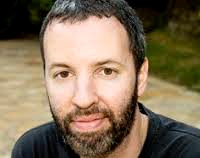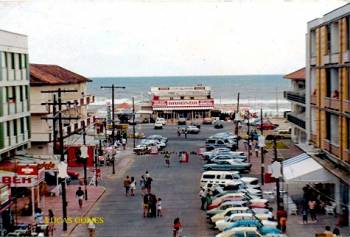“I often dreamed of the moment of [my classmate’s] fall, a silence that lasted a second, possibly two, a room full of sixty people and no one making a sound as if everyone were waiting for my classmate to cry out or even just grunt, but he lay on the ground with his eyes closed until someone told everyone else to move away because he might be injured, a scene that stayed with me until he came back to school and crept along the corridors, wearing his orthopedic corset underneath his uniform…”—a schoolboy speaker in Porto Alegre, Brazil.
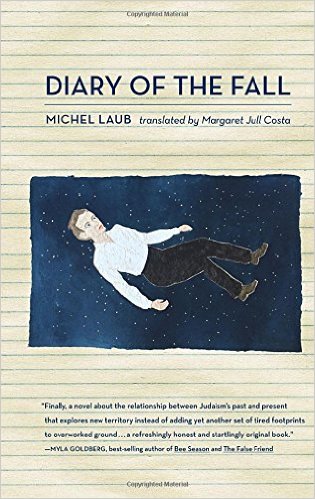 When the unnamed protagonist of this story is in eighth grade, he and the rest of his school class attend a birthday party given for Joao, a fellow classmate, at home in Porto Alegre, Brazil. To celebrate the birthday, five of the boys, including the speaker, gather around the birthday boy during the singing of “Happy Birthday,” then grab him by the arms and legs, with the speaker supporting his neck, and give him “the bumps,” tossing him into the air thirteen times, as they have done at other parties. This time, on the thirteenth toss, however, the boys, apparently by pre-arrangement, do not catch Joao, letting him crash to the floor. He sustains serious injuries for which he is hospitalized, needing months to recuperate and after which, on his return to school, he must wear a tight orthopedic corset, all day, every day, no matter how hot the weather, a further torture.
When the unnamed protagonist of this story is in eighth grade, he and the rest of his school class attend a birthday party given for Joao, a fellow classmate, at home in Porto Alegre, Brazil. To celebrate the birthday, five of the boys, including the speaker, gather around the birthday boy during the singing of “Happy Birthday,” then grab him by the arms and legs, with the speaker supporting his neck, and give him “the bumps,” tossing him into the air thirteen times, as they have done at other parties. This time, on the thirteenth toss, however, the boys, apparently by pre-arrangement, do not catch Joao, letting him crash to the floor. He sustains serious injuries for which he is hospitalized, needing months to recuperate and after which, on his return to school, he must wear a tight orthopedic corset, all day, every day, no matter how hot the weather, a further torture.
The speaker, who is thirteen as the novel opens and forty as it ends, describes what, at first, appears to be a childish prank gone wrong, but as the novel continues through short entries in what feels like a memoir, this event proves to have long-lasting significance for the speaker who recognizes it for the bullying it is. In this novel of family life, each of the men in the speaker’s family has dealt with some sort of trauma which has affected his life in a major way. Describing first his early adolescence, including Joao’s fall, the speaker then mentions his grandfather, an Auschwitz survivor whose emotional life ended there, leaving him unable to communicate with his wife and son, the speaker’s father. His grandfather’s only real communication takes place in private where he writes sixteen notebooks full of commentary about life without once mentioning his wife and son – or Auschwitz. The speaker then goes on to describe his father, who inherited the grandfather’s small company and built it into a large, successful business. Like the grandfather, the speaker’s father is not much of a communicator with his son, until a critical event following the bullying and injuries to Joao, which lead to a crisis and a new kind of relationship between father and son. For the speaker hmself, Joao’s fall is a milestone, its effects lasting for many years.
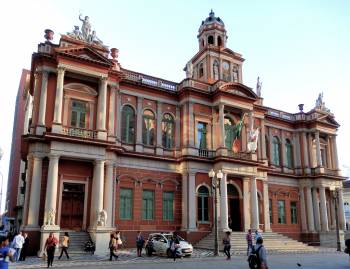
City Hall in Porto Alegre, the city where the action takes place. Photo by Lucas Jordano de Melo Barbosa
A foil for the speaker, classmate Joao is the son of a bus driver who sells cotton candy to earn enough money to fill the gap between the son’s scholarship aid and the tuition at his private school. Joao is also “different” from the other students in that he is the only boy in his class who is not Jewish. While the other boys, including the speaker, have had their Bar Mitzvah celebrations, with a class party given by each set of wealthy parents, Joao has had no parties – until his thirteenth birthday, which his father holds at a relative’s house because his own is too small. There, in front of his entire family, Joao is humiliated by his fellow students. Despite his lack of financial resources and lack of friends, however, Joao never gives in to mockery, his pride sustaining him. Later, in the days following the trauma of his injuries, he does not say a word of reproach, nor does he tattle or act against the others in his class.
Brazilian author and journalist Michel Laub, who won the Brasilia Prize for this novel in 2012, calls his book a “novel,” though it feels far more personal, as if it comes directly from the author’s heart, a book filled with people and places vibrantly described. Crafted to reflect the observations of someone who is the age of the speaker at the time of the narrative, the novel provides a clear picture of a highly sensitive young person who is also naive, willing to follow the crowd and not yet thoughtful enough to anticipate the effects of some of his actions. As the speaker shares the big events of his life, the reader also sees his growth. Individual sections follow a clear chronology, though the sections associated with the grandfather, father, and speaker rotate through time and the speaker’s memory, and as the author develops the portraits of each of these three male characters, he also withholds information to build suspense. The conclusion, which Laub entitles “The Fall,” is about the speaker’s own “fall” as an adult, and the brief final section, entitled “the Diary,” reflects the speaker’s own notes and confessions about life after his adolescent years.
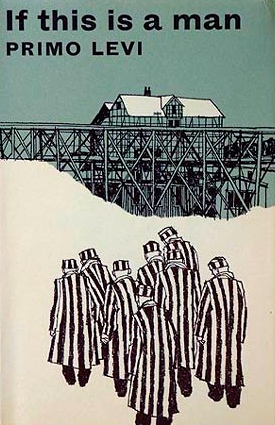
References to Primo Levi’s IF THIS IS A MAN anchor the themes of the novel and the experiences of the speaker’s grandfather.
As Laub shows three different generations and the issues that constitute the biggest crises for them, the reader sees how each of the males in the family has a narrower, more individualized view of what is important. Because there is, of course, no comparison between the horrors of Auschwitz and the injury of a thirteen-year-old at a birthday party, however unfortunate the injuries to Joao are, the author puts these events into different contexts. The grandfather illustrates the grand fall of a nation to a consummate bully, with the subsequent effects on the grandfather’s own inner life, and the author uses references to Primo Levi’s If This is a Man, to show how personal the effects of the Holocaust are for survivors. The speaker participates in bullying on a small, personal level, and he, too, bears the effects throughout his life, including the hidden guilt connected with his own fall – the world writ much smaller.
This novel is a human story, not the story of great world events, and the author matches his style to his purpose as the speaker tells his story. Written with all the colloquialisms of natural speech and thought, a given sentence, in which the speaker begins and goes on and on, may be a paragraph or pages long. Though one sentence here is three hundred thirty words long – and that may not be unique – it captures the cadences of the English language so exactly and feels so right that I did not even notice, at first, how long the sentence really was. Translator Margaret Jull Costa captures all this and brings it alive in her remarkable translation recreating the youthful tone of the beginning, the more troubled tone of the middle, and the final resolution of the speaker as a forty-year-old. Costa’s ear is so finely tuned that there is no feeling that this is a novel in translation.
Photos, in order: The author’s photo is from https://www.cam.ac.uk/
The City Hall in Porto Alegre, Brazil, by Lucas Jordano de Melo Barbosa appears on http://www.skyscrapercity.com. He has a Flickr page here: https://www.flickr.com/
The beach at Capao de Canoa by Lucas Gomes may be found here: https://banjomanbold.wordpress.com/
The cover of Primo Levi’s If This is a Man is from http://www.otago.ac.nz/
